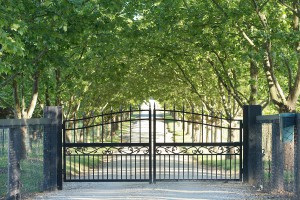Choosing the Right Gate Material for You
If you’re exploring materials for a new gate, you might know that wood and metal gates are the most traditional options. There are benefits for both choices, but one may be more fitting for you depending on your situation. Here is a breakdown of each type of material for you to consider.
The cost, appearance and strength of a wood gate greatly depend on the type of wood used. There are many styles, and you can even paint or stain wood to take on the qualities of the rest of your property. Hardwood is perhaps the most visually appealing type of wood, but keep in mind it is also on the pricier end.
Both wood and metal gates have cheaper options as well. More affordable woods like pine are easier to work with, and can be altered to suit your tastes. Other woods such as cedar are naturally resistant to harsh weather and pests. You may want to take your climate into account when choosing gate material.
A metal gate’s most remarkable quality is arguably its durability. Most types of metal are extremely strong, with steel being the top choice because of its added aesthetical appeal. As you explore materials, you’ll likely notice that painted black steel can take on the characteristics of wrought iron. Wood and metal gates that use transforming methods can be a smart investment at a lower cost.
There are some more traditionally attractive metal options like bronze and copper, but are fairly expensive and harder to come by. Affordable aluminum has become more popular as well, but may lack a bit in strength. Keep in mind that metal typically needs more maintenance, but the visual appeal might be worth it.
You should be aware that overly heavy gate material could potentially cause damage. Consult a company that can help guide you in your exploration of wood and metal gates, and find the perfect gate for you.

